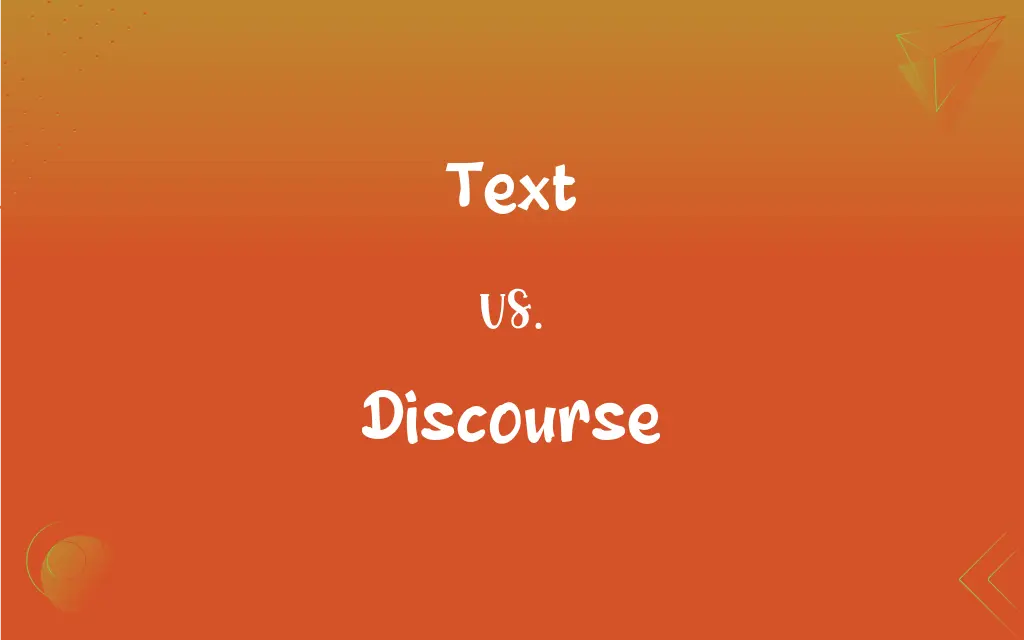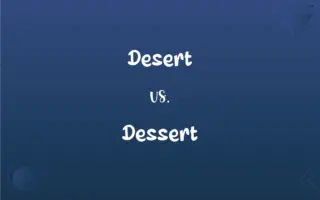Text vs. Discourse: What's the Difference?
Edited by Janet White || By Harlon Moss || Published on November 29, 2023
Text refers to the written or printed words in a document, while discourse concerns spoken or written communication in its entirety, including context.

Key Differences
Text commonly denotes written or printed material in a linear and structured form. It could be as brief as a sentence or as extensive as a book. On the other hand, discourse extends beyond the words and includes the broader context, interaction, and the socio-cultural practices in which language use is embedded.
While a text can be isolated and static, discourse involves dynamics, nuances, and the interplay of elements in communication. Discourse emphasizes not just the language but the intentions, relationships, and power dynamics that shape communication. A text, in its simplicity, can be seen as a subset or a tangible component of the broader, more complex discourse.
Linguistically, when scholars analyze a text, they may focus on its grammar, vocabulary, and structure. In contrast, discourse analysis delves into the patterns of communication, the purpose behind statements, the relationships between speakers, and the cultural and social contexts in which communication occurs.
The utility of both text and discourse is evident in various academic disciplines. For instance, in literature, a text might refer to a specific manuscript or version of a written work, while discourse could encompass the conversations, critiques, and interpretations that surround that work.
It's valuable to recognize that while every discourse contains text, not every text is examined as discourse. The choice to view language as text or discourse depends on the perspective and purpose of the analysis.
ADVERTISEMENT
Comparison Chart
Definition
Written or printed material.
Broader communication including context.
Focus
Linear and structured form.
Dynamics, context, and interaction.
Analysis
Grammar, vocabulary, structure.
Patterns, intention, relationships, socio-cultural context.
Utility in Study
Specific manuscripts or versions of written work.
Conversations, critiques, interpretations.
Relationship
Subset or component.
Encompasses text and goes beyond.
ADVERTISEMENT
Text and Discourse Definitions
Text
The main body of a printed work, excluding headers or footnotes.
The text was dense, with few illustrations.
Discourse
Spoken or written communication.
Their discourse covered various topics.
Text
A sequence of sentences in written form.
The text of his speech was moving.
Discourse
A linguistic unit larger than a sentence.
The narrative discourse was rich in detail.
Text
A book or other written work.
She referred to the text during her lecture.
Discourse
Continuous expression, either spoken or written.
The president's discourse lasted for an hour.
Text
Written or printed material.
The text on the page was legible.
Discourse
Formal discussion on a topic.
The panel engaged in a discourse about climate change.
Text
The original words of an author.
The director adhered closely to the play's original text.
Discourse
The process or power of reasoning.
Philosophical discourse challenges our beliefs.
Text
The original words of something written or printed, as opposed to a paraphrase, translation, revision, or condensation.
Discourse
Verbal expression in speech or writing
Political discourse.
Text
The words of a speech appearing in print.
Discourse
Verbal exchange or conversation
Listened to their discourse on foreign policy.
FAQs
Can the terms text and discourse be used interchangeably?
No, text refers to written material, while discourse encompasses broader communication, including context.
Is every text a discourse?
While every discourse contains text, not every text is analyzed as discourse.
What does discourse analysis involve?
It studies patterns of communication, intentions, relationships, and the socio-cultural contexts of language use.
Can a single sentence be a text?
Yes, a text can be as short as a sentence or as long as a book.
Is discourse always verbal?
No, discourse can be both verbal and written, encompassing wider communication dynamics.
How do context and culture impact discourse?
They shape the meanings, interpretations, and dynamics of the communication.
How does the medium (e.g., book, blog, speech) affect discourse?
The medium can influence the style, accessibility, and engagement level of the discourse.
Can body language be part of discourse?
Yes, in spoken discourse, non-verbal cues like body language contribute to the overall communication.
Can a text exist without discourse?
A text can exist in isolation, but when communicated or shared, it becomes part of a discourse.
Why is discourse vital in sociology and anthropology?
It helps study societal norms, power dynamics, and cultural interactions through communication.
Why are both text and discourse important in communication studies?
Text provides the tangible material, while discourse offers a broader view, encompassing context and interaction dynamics.
Can a novel be analyzed as a discourse?
Yes, considering not just the text but the themes, cultural context, and interactions therein.
What is textual analysis?
It's a method of analyzing the structure, content, and context of texts.
Is every written work a text?
Yes, any structured sequence of written words can be considered a text.
Can an entire book be considered a single text?
Yes, a book can be viewed as a cohesive text, though it may contain multiple smaller texts within.
Why is context important in discourse?
Context provides the setting and background, influencing interpretation and understanding in discourse.
How does text differ in print and digital mediums?
While the content might be the same, the presentation, accessibility, and interaction with digital text can differ.
Does discourse always follow grammatical rules?
While text often adheres to grammar, discourse can involve colloquialisms, interruptions, and informalities.
Can images be part of a discourse?
Yes, in modern discourse analysis, visual communication like images can be included.
Is the study of discourse only linguistic?
While rooted in linguistics, it also intersects with sociology, anthropology, and cultural studies.
About Author
Written by
Harlon MossHarlon is a seasoned quality moderator and accomplished content writer for Difference Wiki. An alumnus of the prestigious University of California, he earned his degree in Computer Science. Leveraging his academic background, Harlon brings a meticulous and informed perspective to his work, ensuring content accuracy and excellence.
Edited by
Janet WhiteJanet White has been an esteemed writer and blogger for Difference Wiki. Holding a Master's degree in Science and Medical Journalism from the prestigious Boston University, she has consistently demonstrated her expertise and passion for her field. When she's not immersed in her work, Janet relishes her time exercising, delving into a good book, and cherishing moments with friends and family.






































































